|
>>CFP
News /
announcements>>
Writers of the Year
Forum
Visit IRCALC Forum for discussions on poetry, literature, language, theory, creativity
and contemporary issues
☼☼☼
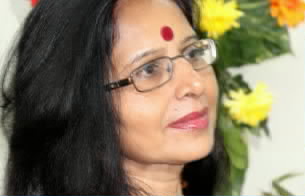
�Ekwefi and Ezinma still remain my favourite characters�
I began my research
when feminism had just become a fashionable word in India and most of my
contemporaries have either made outstanding significant contributions to
the feminist movement or to feminist criticism. My problem with my
activist friends and feminist scholars was that euro-american feminist
theory failed to account for alternative feminisms � African-American
womanism or more subtle forms of resistance that accord women in
traditional patriarchal societies. However, I do appreciate the light
that western and postcolonial feminist scholars have thrown on Achebe�s
and Soyinka�s aesthetic and cultural blueprint for the 20th century and
the novelists� incorporation of that criticism in the construction of
female subjectivities in their latter novels such as �Anthills.� But
Ekwefi and Ezinma still remain my favourite characters as their gentle
strength reminds me of similar characters in Indian fiction and society.
Gera Roy:
Lit. Chat
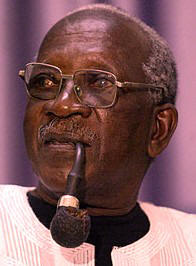 "Standing
at a corner and stretching an arm to receive alms constitutes begging.
... of course. There are now the corrupt people inside the offices
in the administration (and) corrupt police officers who stand at
the corners of the roads....One cannot say flat out they are beggars,
but when they use their offices for corruption, there are nevertheless
beggars, if you want, like the one who sits at the corner of the streets
or in front of the mosque� to that we can agree. Now there are countries
in Africa such as Nigeria or Senegal where one sees the petty civil
servant who does not manage to tie both ends (before the end of the
month) becoming corrupt� people like that we can accept as belonging to
a rotten system of beggars. And the unemployed of various
categories who trudge our roads? They will end up being beggars. Look at
your cities in Nigeria: Kano, Maiduguri�.Burkina-Faso, Mali too.
� the young people starting from 30 to 40 years of age. We know of these
fathers or mothers in the streets of Dakar on Friday� women who have
twins, who have two children, who beg. ...Xala was a fight
known in Senegalese community as h�l�e. Xala does not speak about
the origin of beggars�. With the middle-class becoming increasingly
small, begging −the beggars− grew increasingly numerous. But Xala
is a kind of metaphor". -
Sembene Lit. Chat. "Standing
at a corner and stretching an arm to receive alms constitutes begging.
... of course. There are now the corrupt people inside the offices
in the administration (and) corrupt police officers who stand at
the corners of the roads....One cannot say flat out they are beggars,
but when they use their offices for corruption, there are nevertheless
beggars, if you want, like the one who sits at the corner of the streets
or in front of the mosque� to that we can agree. Now there are countries
in Africa such as Nigeria or Senegal where one sees the petty civil
servant who does not manage to tie both ends (before the end of the
month) becoming corrupt� people like that we can accept as belonging to
a rotten system of beggars. And the unemployed of various
categories who trudge our roads? They will end up being beggars. Look at
your cities in Nigeria: Kano, Maiduguri�.Burkina-Faso, Mali too.
� the young people starting from 30 to 40 years of age. We know of these
fathers or mothers in the streets of Dakar on Friday� women who have
twins, who have two children, who beg. ...Xala was a fight
known in Senegalese community as h�l�e. Xala does not speak about
the origin of beggars�. With the middle-class becoming increasingly
small, begging −the beggars− grew increasingly numerous. But Xala
is a kind of metaphor". -
Sembene Lit. Chat.
 "People
keep on mentioning this, so they must be right, but I�m not completely
sure why that is. There isn�t any agenda at work, none that I am
conscious of... I�ll hazard a guess though,
and say it has a lot to do with my experience of reading. I guess, as a
writer, I�ve come after the explosion of female writers of the 80s � I
grew up reading Lorna Goodison and Olive Senior and Erna Brodber from
the Caribbean, and Gloria Naylor and Toni Morrison from America, all
these women who themselves were writing about women. So women were very
present and very large in my fictional landscape. I�ve simply ended up
writing the kinds of stories I liked reading, and they are inhabited by
the kinds of characters I fell in love with."
--Miller:
Lit. Chat "People
keep on mentioning this, so they must be right, but I�m not completely
sure why that is. There isn�t any agenda at work, none that I am
conscious of... I�ll hazard a guess though,
and say it has a lot to do with my experience of reading. I guess, as a
writer, I�ve come after the explosion of female writers of the 80s � I
grew up reading Lorna Goodison and Olive Senior and Erna Brodber from
the Caribbean, and Gloria Naylor and Toni Morrison from America, all
these women who themselves were writing about women. So women were very
present and very large in my fictional landscape. I�ve simply ended up
writing the kinds of stories I liked reading, and they are inhabited by
the kinds of characters I fell in love with."
--Miller:
Lit. Chat
 "My poetry or fiction tend to mix myth and reality,
conscious and unconscious, spirituality and physicality, bringing to the
forefront the intrinsic relationship that exists between all these
planes or states of being, and questioning the very notion of what
constitutes reality, or better yet, presenting a reality that is closer
to the �whole reality� that humans inhabit or dwell in � it is very
animist and holistic. It also brings together different
geographical, temporal and cultural spaces. This intertwinement of
different cultural and spatio-temporal realities, and ways of knowing
(epistemologies) creates �narratives� that have multidimensional and
complex meanings, and allows the exploration of the oppressions and
freedoms permeating different societies." "My poetry or fiction tend to mix myth and reality,
conscious and unconscious, spirituality and physicality, bringing to the
forefront the intrinsic relationship that exists between all these
planes or states of being, and questioning the very notion of what
constitutes reality, or better yet, presenting a reality that is closer
to the �whole reality� that humans inhabit or dwell in � it is very
animist and holistic. It also brings together different
geographical, temporal and cultural spaces. This intertwinement of
different cultural and spatio-temporal realities, and ways of knowing
(epistemologies) creates �narratives� that have multidimensional and
complex meanings, and allows the exploration of the oppressions and
freedoms permeating different societies."
Irene: Poetry
Irene: Lit. Chat
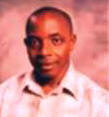
"There is no doubting the
fact that we have enough heroes and martyrs in Africa to use as
reference points in writing... I am usually conscious of this. However,
I also believe that literature is like a sea, which takes in water from
many rivers, rivulets and streams. Once the water from these tributaries
enters the sea or ocean, it becomes common property of all men, and all
can fish in it�. In this case, I think of the image that is most apt for
my immediate need. First, I explore for the African image, if it is not
sufficient, I would go for an alternative..."
More
 "I see the creative process as communication
that goes beyond language; I visualise an interaction that goes towards
the inner dimensions of the individual. And that interaction is neither
imagistic nor symbolic; the interaction transcends the boundaries of
language. It is knowingness that goes so deep within the individual. The
problem comes in lending expression to this knowingness; to this self
instinctual understanding or realisation and then that problem comes
when you want to give verbal expression to this experience within the
individual..." More "I see the creative process as communication
that goes beyond language; I visualise an interaction that goes towards
the inner dimensions of the individual. And that interaction is neither
imagistic nor symbolic; the interaction transcends the boundaries of
language. It is knowingness that goes so deep within the individual. The
problem comes in lending expression to this knowingness; to this self
instinctual understanding or realisation and then that problem comes
when you want to give verbal expression to this experience within the
individual..." More
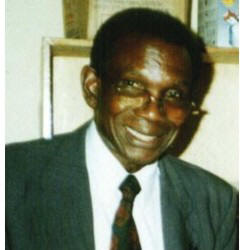 "Generally, many of my characters
represent snippets of the kind of time and period I saw as a child. The
characters I portray were the kind of characters that existed in those
days. Then, the teachers were respected. The teachers were happy to know
that they were bringing up young minds. They served as role models for
their pupils. There was no way teachers combined their duties with other
jobs..." "Generally, many of my characters
represent snippets of the kind of time and period I saw as a child. The
characters I portray were the kind of characters that existed in those
days. Then, the teachers were respected. The teachers were happy to know
that they were bringing up young minds. They served as role models for
their pupils. There was no way teachers combined their duties with other
jobs..."
More
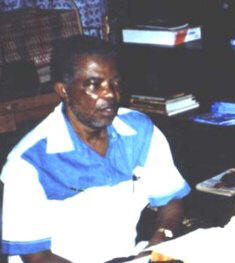 "When I was in the university, most of our
lecturers sounded as if we didn't have drama in Africa. When I
got to the United States I came in contact with drama works from other
parts of the world. I saw Japanese and Chinese drama. But above all how
drama was presented in Japanese culture for instance. Further I studied
history of drama and I realised that many of my teachers were wrong in
supposing that we don't have drama in Africa. They felt that the dances
which were ritualistic in nature lacked dramatic impetus because they
believed that ritual and theatre were opposed to each other..."
More "When I was in the university, most of our
lecturers sounded as if we didn't have drama in Africa. When I
got to the United States I came in contact with drama works from other
parts of the world. I saw Japanese and Chinese drama. But above all how
drama was presented in Japanese culture for instance. Further I studied
history of drama and I realised that many of my teachers were wrong in
supposing that we don't have drama in Africa. They felt that the dances
which were ritualistic in nature lacked dramatic impetus because they
believed that ritual and theatre were opposed to each other..."
More
|

